Deep frying oil is made from vegetable or seed oils and is used to fry foods at high temperatures.
While fried food has a bad reputation for promoting weight gain and increasing risk factors for heart disease, emerging scientific evidence paints a picture that’s a little rosier.
Deep frying oils are particularly sought-after for people on ketogenic diets, since they are a great way to add lots of fat calories to many different foods.
The type of oil you use has a lot to do with its effects on your body, though, so we’ve ranked the ten best types of deep frying oil to use in your cooking.
Research
Rankings
1. Kevala Avocado Oil
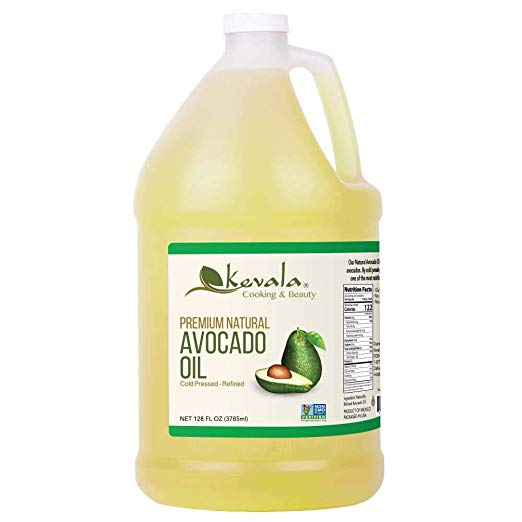
Kevala Avocado Oil is an excellent choice for a healthy and high-smoke point oil that’s not going to lose its nutritive properties when heated. This bulk container of avocado oil is great for regular deep frying if using a source of healthy fats is a priority for you.
2. Kirkland Signature Organic Extra Virgin Olive Oil
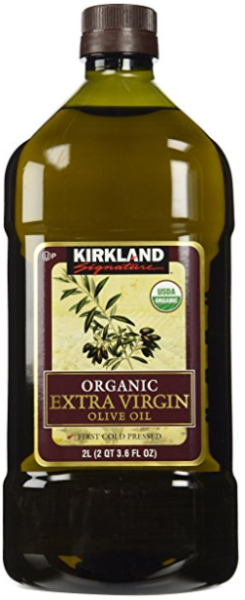
Using olive oil for deep frying might seem a little strange, but olive oil is quite stable and resistant to oxidation at high temperatures and possesses a high smoke point. Beyond that, its health benefits are well-known. Kirkland Signature Organic Extra Virgin Olive Oil is a great choice for deep frying, as it comes in bulk and is organically certified.
3. Snappy Popcorn Peanut Oil
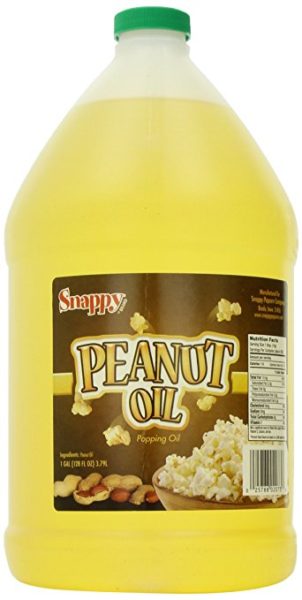
Though Snappy Popcorn Peanut Oil is, as its name suggests, great on popcorn, it’s great for all-purpose deep frying as well. This oil is refined and deodorized, so it’s not going to impart a deep peanut-like flavor, though it’s great for adding a slight nutty taste to deep fried foods.
4. Ellora Farms Extra Virgin Olive Oil
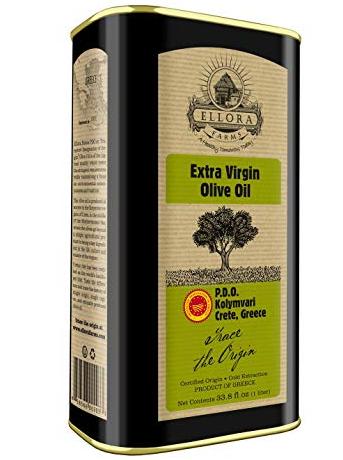
If you want to get a super-high quality olive oil for deep frying, Ellora Farms Extra Virgin Olive Oil is a great choice. This organically certified olive oil is made in Greece and makes the perfect high-quality and healthy oil for deep frying.
5. Baja Precious Avocado Oil
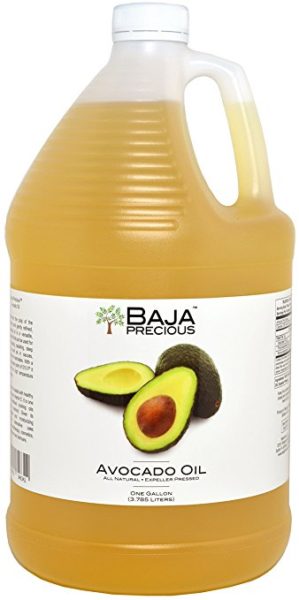
Baja Precious makes a one gallon avocado oil that’s a solid all-around pick for deep frying. The health benefits of avocado oil make this a good choice for frying many different kinds of dishes.
6. La Tourangelle Sun Coco Oil
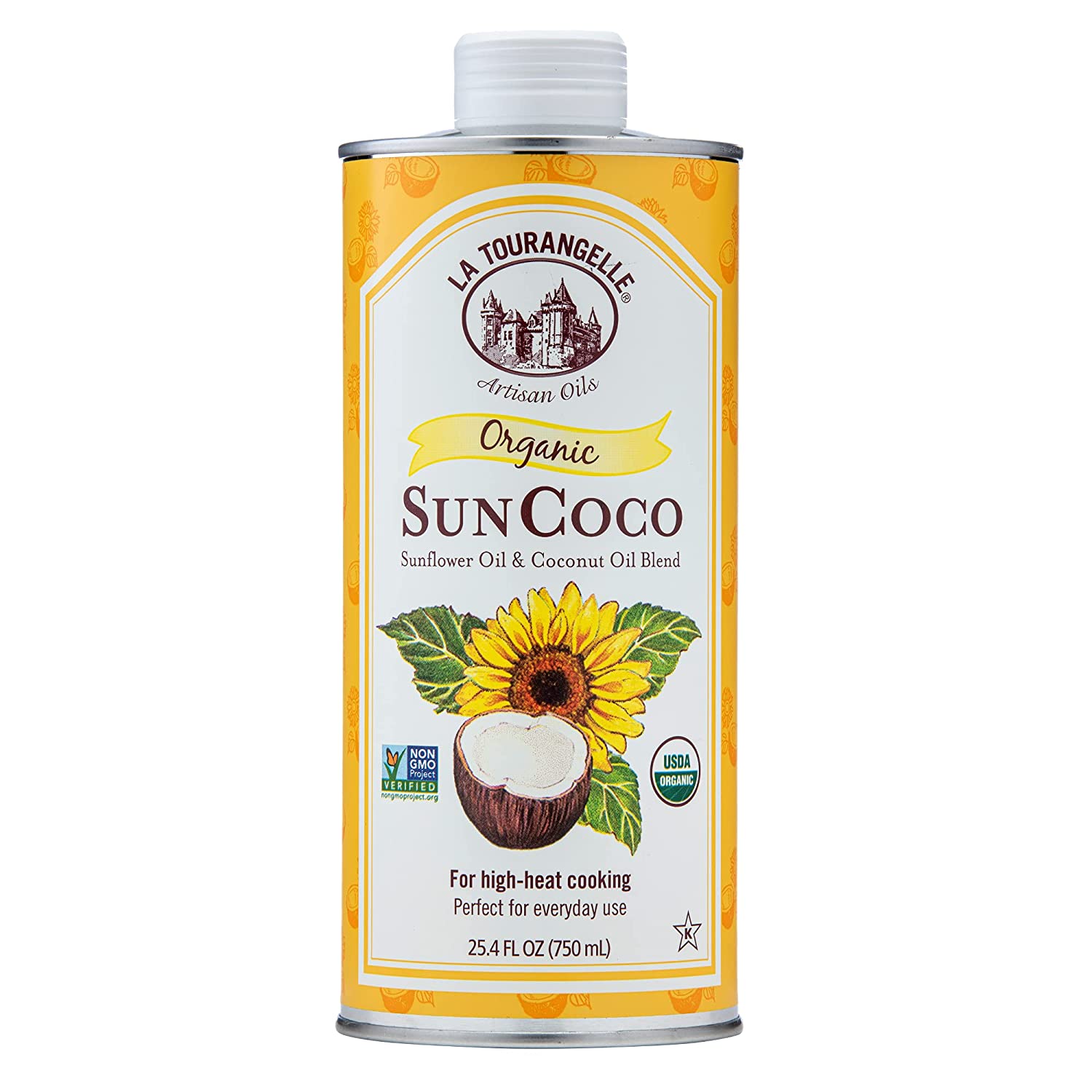
La Tourangelle makes a deep frying oil that’s a blend of sunflower oil and coconut oil. This mixture takes advantage of the smoke point of sunflower oil and the beneficial fats and faint tropical flavor present in coconut oil.
Though sunflower oil does deteriorate slowly at higher temperatures, it isn’t a major issue unless you plan on using your oil more than once.
7. Crisco Pure Peanut Oil
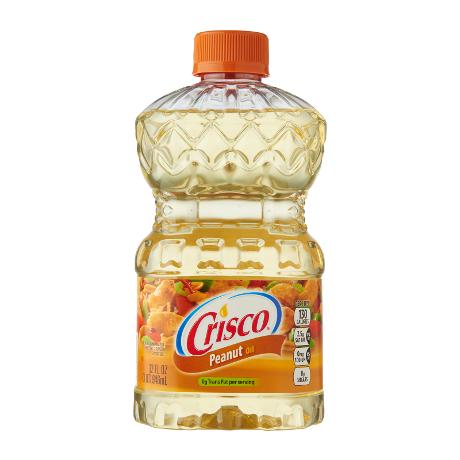
Crisco Pure Peanut Oil is highly refined and barely imparts any peanut flavor at all. Depending on your culinary uses, this could be a good or a bad thing. This bulk buy is great if you do a lot of deep frying, or need a large volume of deep frying oil for a specific occasion.
8. Essential Depot Palm Oil
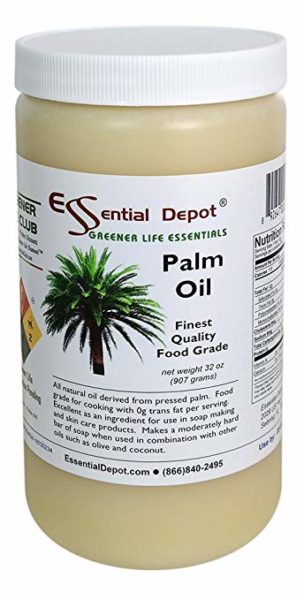
Essential Depot Palm Oil is a great go-to frying oil if you don’t want to impart any particularly strong flavor from your deep frying oil. Palm oil has a neutral and clean flavor so it’s great for more delicate deep fry dishes.
9. Bakers & Chefs Clear Frying Oil
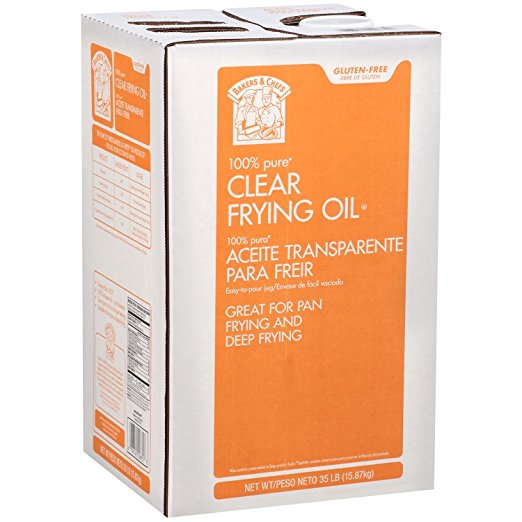
For frequent deep fryer use, there’s no better option than Bakers & Chefs Clear Frying Oil. This 35-pound package will last even the heaviest users a long time. While soybean oil isn’t the healthiest or the most heat-stable oil, it’s acceptable if you don’t plan on reusing your deep frying oil on multiple occasions.
10. Filippo Berio Extra Light Olive Oil
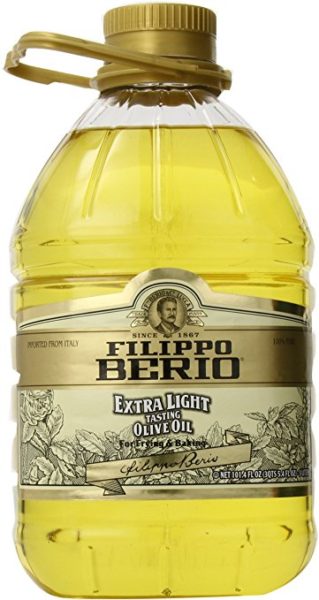
Filippo Berio Extra Light Olive Oil contains an extra-light olive oil, which makes it better able to tolerate high temperatures and exceptionally resistant to oxidation at high temperatures, though it has less antioxidant power than extra virgin olive oil.
Category winners
Best deep frying oil overall: Kevala Avocado Oil
Kevala takes our top overall spot thanks to the excellent deep frying capabilities of avocado oil, the high-quality sourcing of ingredients, and the bulk-sized container that’s easy to use. Kevala is the most versatile option out there for deep frying, no matter the application.
Best deep frying oil for turkey: Snappy Popcorn Peanut Oil
Don’t let the name fool you—this peanut oil isn’t just for popcorn. Thanks to its high smoke point, low propensity to impart flavors, and low saturated fat content, Snappy Popcorn Peanut Oil is the perfect pick for deep frying turkeys.
Best deep frying oil for keto: Kevala Avocado Oil
Kevala Avocado Oil is well-suited for the keto diet thanks to its excellent fat profile. Being virtually devoid of carbs, it’s great for imparting high energy density into deep fried ket-friendly foods.
Best deep frying oil that won’t add flavors: Snappy Popcorn Peanut Oil
Peanut oil is clarified when it is manufactured, which means you won’t get a nutty flavor in the foods you’re deep frying. Its low saturated fat content also helps prevent oil from getting absorbed into the food you’re frying, which can also alter the flavor profile.
Best avocado-based deep frying oil: Kevala Avocado Oil
Avocado oil is one of the healthiest and most popular vegetable oils for deep frying, and for this application we like Kevala Avocado Oil because of its ease of use and great ingredient sourcing.
Best deep frying oil with a high smoke point: Kevala Avocado Oil
When it comes to smoke points, avocado oils are king. With smoke points of over 500 degrees, avocado oils are the best pick for high temperatures. Kevala, our top-rated avocado-based deep frying oil, is the way to go when it comes to high temperature deep frying.
Who should buy deep frying oil?
Deep frying oil is great for restaurants and chefs looking to deep fry food. It is also great for people using air fryers to cook healthier, crispy food. Olive and coconut oil are healthier choices, but canola oil, peanut oil, and avocado oil are also great and have higher smoke points.
How we ranked
When choosing the best deep-frying oils, we first looked at the flavoring of oil. Certain oils, like coconut and olive, import a strong flavor into the foods that are cooked in them. This can cause major taste differences, which is why we ranked products like Fillipo Berio fairly low. Palm oils, like Essential Depot, provided less flavor, which is why they ranked higher on our list.
Next, we looked at the smoke point. Because deep frying cooks at a high temperature, a high smoke point is essential for deep frying oils. A high smoke point helps to improve flavor quality and reduce oil oxidation and damage. As such, oils like Baja Precious and Kevala rank much higher for providing a high smoke point of over 400 degrees. While canola oil has a high smoke point, is it significantly less healthy than avocado oil, which is why it didn’t rank highly. Other oils like peanut oil ranked high, but because of the high allergic reaction possibility, we decided not to hit it in our top 3.
The packaging was another imprint element to consider. Oil is sensitive to light oxidation, meaning that it can go rancid quicker if constantly exposed to light. Of course, you can simply keep it in a cupboard, but the best deep-frying oil products took extra protective measures are provided a dark bottle. Products like Elora Farms ranked highly for packing their oil in a tin bottle. The tin also protected against plastic particles leaking into the oil, further tainting the product and quality.
Benefits
Deep frying can cook food quickly and efficiently. Deep fried foods have become staples in the fast food industry and are also traditional in many cuisines, from delectable deep fried octopus or tofu to French fries or crispy Southern chicken. The method is classified as “dry” cooking because no water is used.
Ideal temperature for deep frying runs between 350° to 375° F (176° to 190° C); when foods are plunged into hot oil or fat, the outside is cooked almost instantaneously. This seals in juices while preventing hot oil from penetrating to the inside.
Moisture sealed into the food is transformed to steam, which literally cooks it from the inside out.
If oil temperatures are too low, fat seeps into food, making it greasy and soggy; a higher temperature can oxidize oil as well as drying out food.
Saturated fats work best for deep frying. Fats and oils with a higher smoke point, as well as those that won’t react with oxygen when heated, are the best for deep frying; this means avoiding polyunsaturated oils and sticking with oils containing mostly monounsaturated oils and saturated oils.
Polyunsaturated oils have chemical structures that include multiple double bonds, and exposure to high heat causes the formation of harmful compounds most people don’t want to ingest.
Taste is also an important factor for deep frying; oils with a more neutral flavor work best because they don’t overpower the taste of the food.
While saturated fats were considered an unhealthy choice in the past, scientific research has disproven this belief with evidence showing they’re harmless and will not lead to heart disease or other chronic disorders. (2, 3)
Coconut oil is the premier choice for deep frying because of its high smoke point and stability over long periods of elevated temperatures.
Coconut oil is one of the best options for deep frying oil. The concentration of saturated fatty acids in coconut oil make it extremely stable; when coconut oil is kept at 365° F (180° C) for a full eight hours, no deterioration of chemical structure takes place. (4)
Cooking with coconut oil can also bring certain health benefits. The antibacterial properties of this oil discourage harmful pathogens, and studies show it can even help you lose belly fat. (5)
Since some coconut oils have more flavor and smell than others; trying a few different brands will allow you to choose one that’s more neutral in taste.
Other saturated fats you may want to experiment with are tallow (from beef), lard (pork), and ghee or clarified butter.
Most fats and oils are a blend of different kinds of fatty acids, but fats derived from animal products are primarily monounsaturated and saturated. Ratios of fatty acids vary according to the animal’s diet. (6, 7)
Conventionally raised commercial beef, for example, will contain higher levels of polyunsaturated fatty acids, while products from grass fed animals are heavier on saturated and monounsaturated fats. (8)
Because fats from grass fed animals will be less vulnerable to damage from oxidation, these are better choices than fats from commercially grown beef.
Lard and tallow are generally available in supermarkets, and you can also save the drippings from meats you cook yourself for frying other foods at a later time.
The small amounts of protein and carbohydrates remaining in butter make it unsuitable as a choice for frying, since they will burn at higher temperatures. Solids have already been removed from clarified butter and ghee, although these are better used for sautéing or stir fry.
Not all oils are equally effective for deep frying. A variety of fats and oils have been traditionally used for deep frying; we’ll see how desirable each of them is in terms of effect on health.
Olive oil is among the healthiest fats, and since it contains mostly monounsaturated fats with single bonds, it’s relatively stable for high temperature cooking.
One analysis indicated olive oil can be continually heated for up to 24 hours before any appreciable amount of oxidization begins to occur. (9) However, the flavor and smell will probably be compromised if kept hot for long periods.
Avocado oil is another good choice for deep frying; like olive oil, it is primarily composed of monounsaturated fats and has a high smoke point (520° F or 270° C), and remains stable for a long time at high heat. The taste of avocado oil runs a little on the nutty side.
Peanut oil is popular for deep frying because of its neutral flavor and the fact that it doesn’t take on the taste of foods being deep fried, so it can be used repeatedly. (10) It also has high smoke point (445° F or 230° C), but since nearly a third of the fatty acid content is polyunsaturated, it’s more vulnerable to oxidative damage. (11)
Palm oil is made up mostly of monounsaturated and saturated fats, and flavor is neutral, so it can be an excellent oil for frying. Ecological concerns about the sustainability of the palm oil industry may be the biggest issue with this oil.
Side effects
There is a long list of vegetable oils that should never be used for deep frying, and avoiding them altogether is a good idea, since they are chemically extracted from seeds or grains, and the process can leave up to up to 4% trans fats, which are toxic.
These oils also have a bad ratio of omega 3 and omega 6 fatty acids, and a poor balance can have disastrous effects on health, potentially contributing to the development of chronic diseases. (12)
Deep frying with any of the following oils will cause oxidative damage and generate harmful compounds. (13) Oils you should try to avoid for deep frying include canola or rapeseed oil, safflower oil, corn oil, soybean oil, cottonseed oil, sunflower oil, grapeseed oil, and sesame oil.
On top of this, many health authorities still caution that the debate over saturated fat is not settled.
While it may not be as universally unhealthy as previous research suggested, it’s not outright advantageous either, and there are still several health conditions that have been linked to diets that are very high in saturated fats (especially when those saturated fats come from animal sources).
FAQ
Can olive oil be used for deep frying? Olive oil is one of the healthier options when it comes to deep-frying. In a 2010 study, researchers analyzed how stable olive oil is when it’s exposed to common deep-frying conditions. The study concluded that olive oil performs well in these conditions, but the actual level of performance depends on the specific type of olive oil (14).
In addition to being a solid deep-frying oil option, olive oil may be directly linked to several health benefits. In a 2018 study researching the potential health benefits of olive oils and its composition, scientists discovered that olive oil contains antioxidants and may also provide anti-allergic, anti-inflammatory, and anti-mutagenic effects in consumers (15).
Though deep frying foods is commonly associated with an unhealthy diet, using olive oil can significantly reduce the health side effects and even boost overall health.
What is deep-frying? Deep frying is a method of cooking that involves soaking food in hot oil. Deep frying is one of the quickest methods of cooking foods like meat and french fries and provides a taste unparalleled by other cooking methods. Because of these reasons, deep frying foods is the most common method of cooking in fast-food chains and restaurants. That also makes deep-fried foods some of the cheapest foods you can buy.
What is the best oil to use in a deep fryer? Canola oil and peanut oil aren’t the healthiest options when it comes to deep-frying food, but they are the most effective at getting the job done. The major reason these two oils are so effective is that they have much higher smoke points than other types of oils.
With a high smoke point, you’re more likely to be able to cook your food thoroughly without the nutritional value or taste of the food becoming affected. With a higher smoke point, you have plenty more options when it comes to what foods you can actually deep fry.
Can vegetable oil be used for deep frying? Vegetable oil is usually the recommended oil for deep frying for a few reasons. First off, vegetable oil does not contain the same amount of fat as other types of oils and fats that come from animal products that are commonly used for deep frying.
The other major reason vegetable oil is so popular for deep frying is its smoke point of 450°F. This means you have more options when it comes to which types of deep-fried foods you can make. It also means the oil can be used for much longer than other oils without risking quality and taste.
What is a good, cheap oil that I can use for deep frying? The best cheap oil that you can use for deep frying would be corn oil and canola oil. These oils both do what they’re supposed to do when it comes to deep-frying, but there’s no guarantee that they’re healthy.
Which oil is the healthiest for deep frying? There aren’t many healthy oils when it comes to deep-frying, but some oils are healthier than others. Some oils you might want to consider using for deep frying include extra-virgin olive oil, canola oil, avocado oil, and olive oil. These are, by far, some of the healthiest alternatives to the usual deep frying oils.
How do you know when to throw away frying oil? If you’ve already used the oil, your best bet would be to get rid of it after the first use. When you’re getting rid of your frying oil after you’ve used it, it’s important that you dispose of it correctly. The most important thing you need to do is let the oil cool a little before you do anything with it. Do not, under any circumstances, pour your used frying oil down the drain of the sink or toilet. Deep frying oils are known to harden after cooling and will clog your drains and pipes.
Is it safe to reuse cooking oil after deep frying? In general, it’s safe to reuse oil after you deep fry food. The most important thing you need to think about is the smoke point of your oil and whether or not your oil reached it during previous uses. If your oil did reach its smoke point, reusing your cooking oil to deep fry again will leave your food with an unsavory taste.
If you’re planning to reuse cooking oil that you’ve used to deep fry, you need to make every effort to strain and filter the oil to make it as pure and clean as possible. This is the best way to guarantee a high-quality oil.
Why is deep-frying unhealthy? Deep-frying is normally considered unhealthy because it loads the food you’re consuming with exorbitant amounts of salt, fat, and calories. If deep-fried foods become a part of your normal diet, you’re making yourself more susceptible to developing chronic health conditions.
In a study released in 2019, researchers intensely analyzed the role that deep-fried foods may play in the development of serious health conditions like cancer and cardiovascular diseases. Over the course of about 20 years, study participants were observed, with scientists eventually concluding that daily or frequent consumption of deep-fried foods significantly increases the risk of developing cancer and cardiovascular diseases that ultimately led to death (16).
When considering the nutritional content of deep-fried foods, it’s pretty obvious what the possible health consequences could be. With higher levels of fat, salt, and calories, you’re more likely to put excess strain on your heart and other organs, gain weight, and clog your arteries.
What kind of oil is for deep frying? You can practically use any plant-based oils to deep fry foods, such as peanut oil, corn oil, canola oil, sunflower oil, vegetable oil, avocado oil, and coconut oil. If you’re trying to figure out which deep-frying oil would be best for you, it’s best to research the benefits and risks of each oil and whether or not they fit your health and deep-frying needs.
What temperature is best for deep frying? Depending on the type of food you’re deep frying and the oil you’re using, the temperature your deep fryer should be set at will vary. For the most part, you should be fine with a temperature between 375°F and 400°F.
You also need to consider the smoke point of your oil. You should not set your deep fryer to anything above your oil’s smoke point and do your best to stay relatively below the smoke point. If the food you’re cooking requires a certain temperature, use an oil that’s suitable for that temperature.
How long does it take to heat oil for deep frying? Typically, it should take less than 10 minutes to heat oil for deep frying. Obviously, a higher temperature would take a bit longer to reach than a lower temperature. In terms of how long it would take to deep fry certain foods, it usually only takes a few minutes for smaller foods and a maximum of 15 minutes for more dense or larger food items.
What type of oil do restaurants use for deep frying? The most popular oils used for deep frying in restaurants are canola and peanut oils. Both of these oils are relatively cheap to buy in bulk, making them the perfect choice for restaurants that are responsible for cooking hundreds of meals per day. They also have high smoke points that are above 400°F. This makes them much more versatile when it comes to the type of food that the restaurant can make.
What does deep-frying oil taste like? The taste of the oil depends on the type of oil you’re using. Olive oil tends to have an olive taste, coconut oil has a coconut taste, and vegetable oil tends to have a neutral taste.
What’s the difference between air fryers and deep fryers? While both perform the same functions, air fryers are considered a healthier cooking method. When you air-fry foods, you’re significantly reducing the amount of fat found in the foods you’re cooking while still providing a rather similar taste to deep-frying. Though they’re undoubtedly healthier than deep fryers, air fryers take longer to cook food, and you can only cook so much at a time.
Is canola oil a bad deep-frying oil? Canola oil isn’t really that bad for you and is very similar to other types of deep frying oils. Like most oils, canola oil also has a high fat content. But, the fats are the healthy kind and can actually help you to reduce your cholesterol levels and cut your risks of developing serious health conditions. Canola oil is actually one of the best oils when it comes to deep-frying.
Is corn oil a bad deep-frying oil? Corn oil is incredibly popular when it comes to deep-frying foods in restaurants and fast-food chains, but it’s not very healthy. The major concern is that there isn’t much nutritional benefit of consuming corn oil. It’s essentially pure fat and contains very few vitamins or minerals.
There is also some scientific evidence that leads medical professionals to believe that corn oil can actually make you more susceptible to developing diseases and health conditions. If you can, your best bet would be avoiding the consumption of corn oil, particularly when deep-frying foods.
Related Articles
Recap
Deep frying got a bad reputation because we were wrongly advised that dietary fat would lead us straight down the heart attack highway. The latest research suggests that may not be the case, though the debate over the role of saturated fats in determining long term health is not yet settled.
With deep frying, you should keep in mind the fact that no matter what oil you use, your food will end up with more calories than it started with. You should watch those extra calories, since eating deep fried foods is associated with weight gain, especially if obesity runs in your family. (17)
Consumption of foods fried in unstable and unhealthy oils is a health gamble you might not want to take, but the occasional indulgence, using suitable oils and fats as described above, can be a safe and even beneficial part of your diet when used appropriately.
For Bodynutrition’s #1 recommended deep frying oil, click here.